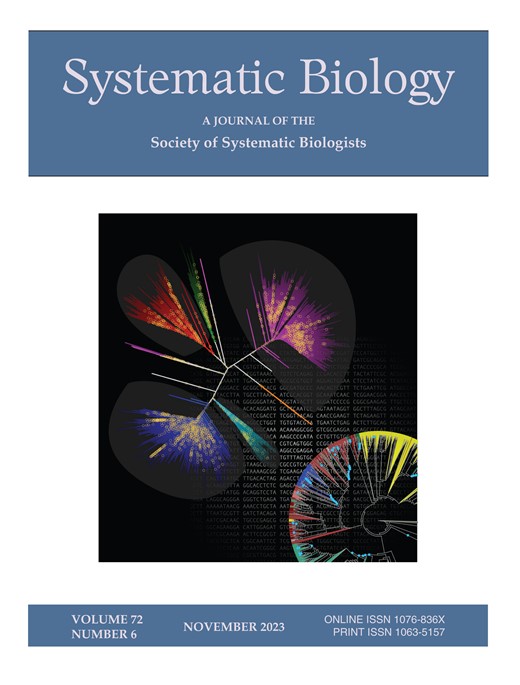Improved robustness to gene tree incompleteness, estimation errors, and systematic homology errors with weighted TREE-QMC
IF 5.7
1区 生物学
Q1 EVOLUTIONARY BIOLOGY
引用次数: 0
Abstract
Summary methods are widely used to reconstruct species trees from gene tres while accommodating discordance from incomplete lineage sorting; however, it is increasingly recognized that their accuracy can be negatively impacted by incomplete and/or error-ridden gene trees. To address the latter, Zhang and Mirarab (2022) updated the popular summary method ASTRAL so that it weights quartets based on gene tree branch lengths and support values. The implementation of these weighting schemes presented computational challenges, leading Zhang and Mirarab (2022) to replace ASTRAL’s original algorithm (i.e., computing an exact solution within a constrained search space) in favor of search heuristics based on phylogenetic placement. Here, we show that these weighting schemes can be effectively leveraged within the Quartet Max Cut framework of Snir and Rao (2010), introducing weighted TREE-QMC. The incorporation of weighting schemes into TREE-QMC required only a small increase in time complexity compared to the unweighted algorithm; fortunately, the increase in runtime was also small, behaving more like a constant factor in our simulation study. Moreover, weighted TREE-QMC was fast and highly competitive with weighted ASTRAL, even outperforming it in terms of species tree accuracy on some challenging simulation conditions, such as large numbers of taxa. In reanalyzing two avian data sets, we found that weighting quartets by gene tree branch lengths can improve robustness to systematic homology errors and can be as effective as removing the impacted taxa from individual gene trees or removing the impacted gene trees entirely. Lastly, our study revealed that TREE-QMC was robust to extreme rates of missing taxa, suggesting its utility as a supertree method. Source code for weighted TREE-QMC is available on Github: (https://github.com/molloy-lab/TREE-QMC)改进了加权tree - qmc对基因树不完备性、估计误差和系统同源性误差的鲁棒性
摘要方法被广泛用于从基因树重建物种树,以适应不完整谱系排序的不一致;然而,越来越多的人认识到它们的准确性会受到不完整和/或错误丛生的基因树的负面影响。为了解决后者,Zhang和Mirarab(2022)更新了流行的汇总方法ASTRAL,使其基于基因树分支长度和支持值对四重奏进行加权。这些加权方案的实现带来了计算上的挑战,导致Zhang和Mirarab(2022)取代了ASTRAL的原始算法(即在受限的搜索空间内计算精确解),而采用基于系统发育定位的搜索启发式算法。在这里,我们展示了这些加权方案可以在Snir和Rao(2010)的四重奏最大切割框架内有效地利用,引入加权TREE-QMC。与非加权算法相比,将加权方案纳入TREE-QMC只需要增加少量的时间复杂度;幸运的是,运行时间的增加也很小,在我们的模拟研究中表现得更像是一个常数因素。此外,加权tree - qmc速度快,与加权ASTRAL竞争激烈,甚至在一些具有挑战性的模拟条件下(如大量分类群),在物种树精度方面优于加权ASTRAL。通过对两个鸟类数据集的再分析,我们发现以基因树分支长度为权重的四元组可以提高对系统同源性错误的鲁棒性,并且可以像从单个基因树中删除受影响的类群或完全删除受影响的基因树一样有效。最后,我们的研究表明,TREE-QMC对极端缺失率的分类群具有鲁棒性,表明其作为超树方法的实用性。加权TREE-QMC的源代码可在Github上获得:(https://github.com/molloy-lab/TREE-QMC)
本文章由计算机程序翻译,如有差异,请以英文原文为准。
求助全文
约1分钟内获得全文
求助全文
来源期刊

Systematic Biology
生物-进化生物学
CiteScore
13.00
自引率
7.70%
发文量
70
审稿时长
6-12 weeks
期刊介绍:
Systematic Biology is the bimonthly journal of the Society of Systematic Biologists. Papers for the journal are original contributions to the theory, principles, and methods of systematics as well as phylogeny, evolution, morphology, biogeography, paleontology, genetics, and the classification of all living things. A Points of View section offers a forum for discussion, while book reviews and announcements of general interest are also featured.
 求助内容:
求助内容: 应助结果提醒方式:
应助结果提醒方式:


